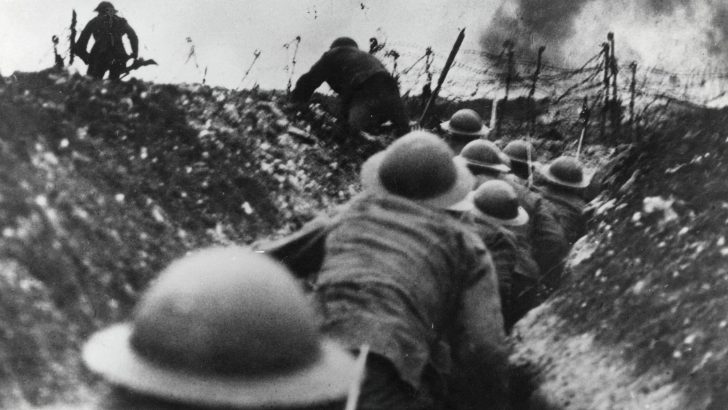Our shifting views towards World War I show how fickle we can be, writes David Quinn
It is now commonplace for Irish pupils to learn the famous poem by World War I poet, Wilfred Owen, ‘Dulce et Decorum Est’. Owen was killed on the Western Front in 1917.
Owen’s poem mocks the idea that it is “sweet” to die for one’s country. His poem has now shaped the view of World War I held by generations of people, namely that the war was a futile, pointless waste of life driven by an overly romanticised view of your own country and how heroic it would be to die in battle for it.
The TV comedy Blackadder Goes Forth, made in the 1980s, reinforced this view along with the attitude that British soldiers were “lions led by donkeys”.
But the Owen view did not begin to predominate until the 1960s, that is, about 50 years after the end of the war. Before then, other wartime poets sold far more widely than Owen, for example, Rupert Brooke, who also died in the war, and who reassured people that their loved ones had not died in vain.
Hew Strachan, a historian of World War I, challenges the Owen view. He emphasises that both during and after the war many veterans regarded it as the greatest experience of their lives. He says in his book The First World War that, “boys were often told of an intensity of experience whose loss their fathers regretted”.
The writer and veteran H.C. McNeile wrote of his time in the war: “Cementing everything, crowning everything, the spirit of camaraderie, of good fellowship.”
Disservice
This seems inconceivable to us now, but that is because we are so accustomed to the Wilfred Owen view. His, however, was clearly not the attitude of all veterans by any means, and it is disservice to them to insist that they had fought in vain when clearly they felt otherwise.
Our view today is also coloured by the first day of the Battle of the Somme, when 20,000 soldiers of the British army died. Thankfully, this was a completely untypical day, a disaster of epic proportions.
Over the more than four years of the war, over six million men served in the British army, and about 10% of the total were killed, including about 35,000 Irish men from the whole island.
In the Republic of Ireland, we have an increasingly ambiguous attitude towards World War I. It used to be totally unambiguous: if you were an Irish nationalist then it was verging on treachery to have fought for the British army in that conflict.
Irish Catholics who did, had to keep quiet about it. It was more understandable that Irish Protestants would join the British army, but in our minds the fact that they would, only showed where their true loyalties lay.
Today, however, attitudes are changing fast. Thanks to books like Pat Kenny’s To Raise the Fallen, which deals with Fr Willie Doyle SJ who served and died as a chaplain in the war, practicing Catholics can see that serving in the British army might not have been so alien, after all.
The more general public is now far more aware than before that thousands of Irish Catholics, as well as Irish Protestants, fought in that war and gave their lives for what they believed was a good cause, namely fighting Germany. Irish Catholics who fought in the British army (in both world wars) could see that Germany was the greater evil in both cases, especially in the Second World War.
But there still remains an unavoidable ambiguity because just two years ago we were celebrating and remembering the Easter Rising of 1916 when rebels fought and killed British soldiers and looked to Germany as an ally. They had no special love of Germany in the main, but they saw Britain as the oppressor we had to liberate ourselves from, and Germany as a friend, based on the maxim that “the enemy of the enemy is my friend”.
Very soon we will be marking the War of Independence when we were fighting and killing British soldiers again.
It is natural, therefore, that we should have an ambiguous attitude towards the British army. Yes, Irishmen, including Irish Catholics, served in it many times, but it also killed many Irish people and was the main instrument of British rule here.
Last weekend we were, of course, marking the centenary of the end of World War I. Our political leaders seemed keen to give the impression that the Great War was also our war and appeared to regret past attitudes towards the Irish men who volunteered to fight in the British army.
President Higgins spoke of an “official amnesia that left a blank space in our public memory”.
It is very hard to believe, however, that the current generation of politicians, had they lived just a couple of decades ago, would have been fighting that “official amnesia”. (What was Michael D Higgins doing to counter it in say, 1988?)
On the contrary, today’s politicians would have simply gone along with the conventional wisdom of the time, which was to assume there was something suspicious at best about fighting for the British army back then.
The sudden change of heart shows how fickle we can be. And it also forces us to ask whether an “official amnesia” exists about anything today? Here is just one example: during the marking of the centenary of the 1916 Rising, the Faith of many of the rebels was almost completely forgotten. Why?


 David Quinn
David Quinn
